Al Mayadeen – January 22, 2025
Damascus authorities terminate Russian contract for Tartus port
The new Syrian authorities are reportedly working to boost commercial activity at the port by cutting customs fees by 60%.
Syria's transitional government has taken a decisive step to reduce Russian influence by canceling a long-standing contract with a Russian company managing the Tartus port. Riyad Judi, director of the customs department in Tartus, confirmed the development to al-Watan newspaper on Monday, noting that the revenues from the port would now go entirely to the Syrian state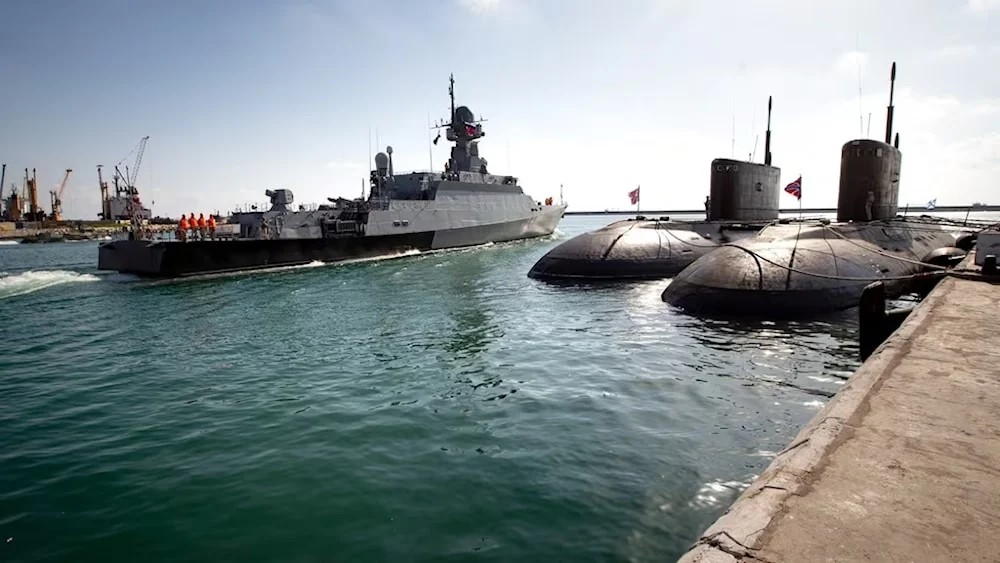 .
.
The agreement, originally signed in 2019 under Bashar Assad's government, granted the Russian firm Stroytransgaz control over the port for 49 years. In return, the company would invest $500 million in the port, keeping 65% of the profits while the Syrian government retained the remaining 35%.
The Tartus port, Syria's second-largest after Latakia, is a critical Mediterranean hub with a capacity of four million tons annually and home to Russia's only naval base in the region. Established in 1971 by the Soviet Union and later expanded in 2017, the base has served as a strategic outpost for Russian military operations in the Middle East.
The new Syrian authorities are reportedly working to boost commercial activity at the port by cutting customs fees by 60%. Judi highlighted the "excellent" activity at Tartus, with ships from Syria, Arab nations, and international operators transporting goods like iron, sugar, and carbonates.
Balancing Russian Ties Amid Western Pressure
The decision to cancel the contract comes as Syria's new leadership faces mounting pressure from Western nations to sever ties with Moscow in exchange for easing economic sanctions. European officials have reportedly linked the lifting of sanctions to Syria distancing itself from Russia.
However, Syria's leadership has so far resisted calls to cut ties with Moscow. Ahmad al-Sharaa, the leader of the transitional government, previously affirmed Syria's strategic partnership with Russia during an interview with Al Arabiya, calling Russia "the second most powerful state in the world" and highlighting the long-standing relationship between the two nations.
Coinciding with the contract termination, the Russian cargo ship Sparta II docked at Tartus after reportedly waiting offshore for two weeks. Media reports suggest the ship carried military equipment, though these claims remain unverified. The docking indicates Russia's continued presence and influence in Syria, even as the new government recalibrates its foreign policy.
Future of Russian Military Bases
The fate of Russia's military bases in Syria—Tartus and Khmeimim—remains uncertain. Reports suggest Russia has redeployed some assets to other Middle Eastern locations, including Libya, following the ousting of Bashar al-Assad. Despite this, Russian Deputy Foreign Minister Mikhail Bogdanov has noted that Moscow remains in contact with Syria's transitional government to ensure the continued operation of its bases and broader cooperation.
Russian officials have underscored the strategic importance of their presence in Syria, citing the Tartus naval base and Khmeimim airbase as critical assets for regional stability and counterterrorism operations. Bogdanov has reiterated that Russia's military presence will not be abandoned and remains essential to its broader geopolitical goals in the Middle East.
Al Mayadeen – January 22, 2025
Palestinian Resistance confront Israeli forces invading Jenin
The Palestinian Resistance forces are engaging in fierce confrontations against the Israeli occupation in the occupied West Bank city of Jenin.
Palestinian resistance forces in the occupied West Bank have continued to confront Israeli forces amid a second day of intense confrontations . Israeli troops, who have besieged homes and assaulted Palestinians during their incursions into towns, are facing fierce resistance from local factions.
The al-Quds Brigades - Jenin Battalion announced that its fighters in the Burqin unit engaged in fierce battles with Israeli forces near a besieged house. The group reported using heavy gunfire and explosives against Israeli troops and vehicles, claiming confirmed hits. Similarly, the al-Aqsa Martyrs Brigade - Jenin Battalion stated that its fighters were involved in intense firefights with Israeli forces near the besieged house in the town of Burqin, west of Jenin.
Local media reported that resistance fighters detonated an explosive device targeting an Israeli bulldozer in Jenin while engaging in combat with Israeli forces. According to witnesses, special forces infiltrated the area, surrounded a house, and used loudspeakers to order its occupants to evacuate. Israeli drones also launched several missiles at the site.
Israeli forces deployed reinforcements, including a military bulldozer, and began demolishing parts of the house. Burqin Mayor Hassan Sobh accused Israeli forces of using women as human shields and forcing families out of the besieged residence before initiating the demolition.
Despite these measures, resistance fighters inside the house reportedly refused to surrender, continuing to fire at Israeli forces. An Israeli drone also opened fire in the Dammaj neighborhood of Jenin refugee camp, intensifying the violence.
Intensifying violence
In other areas, Israeli forces carried out raids in multiple towns across the West Bank. Troops stormed Kafr Qalil near Nablus, the village of Mazraa near Ramallah, and the town of Turmus Ayya, north of Ramallah. The village of Qarawat Bani Zeid in northwestern Ramallah also witnessed incursions.
Meanwhile, in the southern West Bank, settlers attacked residents in Masafer Yatta, south of al-Khalil. According to reports, dozens of settlers assaulted Palestinians in Khirbet Aqwewis, injuring five people and spraying pepper gas, leading to further injuries and hospitalizations. The attack is part of an escalating pattern of settler violence in the region, where residents face daily threats aimed at forcibly displacing them to enable settlement expansion.
Moreover, in a new crime added to its record, Israeli forces assassinated a Palestinian man while he was driving his car with his wife and children in the city of Jenin, in the northern West Bank.
The assassination was documented in a video recorded by the martyr's son from inside the car, which has since circulated widely on social media. Another video filmed by activists shows the car veering off its path and crashing into a sidewalk after the driver was shot.
Bashir Mtahen, Director of Public Relations at the Jenin Municipality, told Anadolu Agency that the victim was identified as Ahmad Shayeb, a resident of Burqin town in Jenin Governorate. "He was returning from kindergarten with his wife and three children," Mtahen stated.
According to Motahen, "The martyr was at the outskirts of Jenin refugee camp, heading towards the city's commercial hub when a sniper positioned at a military outpost in the area opened fire at him."
UN warns Israel’s genocide could spread to West Bank
The United Nations special rapporteur on human rights in Palestinian territories has warned that Israel’s genocidal acts may spread from Gaza to the West Bank, amid an ongoing large-scale military operation in the occupied city of Jenin.
Francesca Albanese made the remarks in a post on X on Wednesday, as the Israeli regime has escalated brutal violence in the West Bank since the ceasefire in Gaza went into effect over the weekend.
“As the long awaited ceasefire in Gaza took place, Israel’s death machinery escalated its firing in the West Bank, killing 10 people in Jenin [on Tuesday],” Albanese said.
“If it is not forced to stop, Israel’s genocide of Palestinians will not be confined to Gaza. Mark my words,” she added.
As the Israeli deadly violence continues in the West Bank, regional countries have voiced serious concerns over the Israeli atrocities and their fallout.
Jordan's Foreign Minister Ayman Safadi described Israeli military offensive in West Bank as “dangerous,” saying the violent raids could “destabilize” the security of the entire region.
Also on Wednesday, Palestinian channels on Telegram shared videos showing Israeli forces heading towards the Jenin refugee camp with military bulldozers, after leaving the al-Jalama checkpoint in the West Bank.
Other footage showed Israeli forces heading towards Jabal Street in the Jenin camp, after storming the city at dawn.
This came a day after Israeli forces killed at least 10 Palestinians and injured dozens of others in an attack on Jenin.
The attack on Jenin, where the regime’s forces have carried out multiple raids and large-scale incursions over the past year, comes only two days after the start of a long-awaited ceasefire between Israel and the Palestinian resistance movement Hamas.
Hamas urged Jenin’s “youth to mobilize and escalate confrontations with the Israeli army.”
The resistance group said that the offensive “launched by the occupation in Jenin will fail, just like all its previous military operations against our people,” in Gaza.
Over the past few years, the Israeli military has conducted numerous raids in the West Bank, which escalated after the onset of the genocidal war on Gaza on October 7, 2023. Palestinians have also been violently attacked by illegal Israeli settlers.
At least 859 Palestinians have since been killed and over 6,700 others injured by Israeli army fire in the occupied territory, according to the Health Ministry.
West Bank faces renewed Israeli brutality after Trump green light
New US President lifts sanctions on illegal settlers while Israel shifts war efforts from Gaza with new military campaign in occupied Palestinian territory.
Kazim Alam
US President Donald Trump might have opened the floodgates for a renewed wave of Israeli violence against Palestinians in the occupied West Bank, barely hours after the dust began to settle in Gaza after 471 days of a genocidal war.
Though the ceasefire has broughtᅠa sense of relief to Palestinians in the besieged enclave reduced to a dystopian wasteland, their brethren in the occupied West Bank are bracing for an Israeli onslaught apparently greenlighted by Trump.
Immediately after taking the oath of office on January 20, President Trump signed anᅠexecutive order to end sanctions on far-right Israeli settler groups and individuals in the occupied West Bank, an area stretching across the eastern border of Israel that Tel Aviv occupied along with East Jerusalem and Gaza in the 1967 war.
The sanctions wereᅠimposed by the Biden administration in eight separate rounds throughout 2024 on Israeli settlers and entities for committing “extremist settler violence in the [occupied] West Bank”.
On the same day when Trump announced the reversal of sanctions, Israeli Chief of Staff Herzi Haleviᅠinstructed the army to “prepare for large-scale attacks” in the occupied West Bank to “pre-empt Palestinian fighters”.
Subsequently, Israeli security forces launched an offensive that it calls the “Iron Wall” in the West Bank city of Jenin, killing at least 10 Palestinians, including a child, ostensibly to “eradicate terrorism”.
Experts say the sanctions removal by the US coupled with the large-scale attacks being planned and executed by Israel may lead to a worsening situation in the occupied West Bank in the coming days.
Though Gaza bore the brunt of Israeli aggression since October 7, 2023, the occupied West Bank also saw increased settler attacks and military incursions, leaving hundreds of people dead and injured.
Experts say the situation is only going to get worse.
“The removal of sanctions could legitimise settlement activities and increase illegal construction on Palestinian land,” says Fida Shehada, a Palestinian Israeli activist who previously served as a municipal council member in Lod, a city near Tel Aviv with a sizeable Muslim population.
“For Palestinians, this could result in the expansion of settlements and an increased likelihood of land confiscation, making it more difficult for them to retain their land and develop economically,” she tells TRT World.
Despite the on-again-off-again peace process over many years, successive Israeli governments have allowed for the expansion of settlements. The number of settlers in the occupied West Bank, excluding East Jerusalem, increased from approximately 110,000 in 1993 toᅠmore than half a million in 2023. A number of Israeli entities have used violence as a tool to strengthen settlers’ presence in the occupied territories.
Rabid nationalist and settler icon, finance minister Bezalel Smotrich, has hailed Trump’s decision, saying the sanctions were a “severe and blatant foreign intervention”.
The Biden administration had sanctioned a total of 17 individuals and 16 entities in Israel last year for causingᅠintense human suffering among Palestinians. The sanctions restricted their ability to transact through formal banking channels.
“This process (of lifting sanctions) could exacerbate tensions and conflicts in the region, as Palestinians view it as a violation of their rights and a threat to the possibility of establishing an independent Palestinian state,” says Shehada.
Israel has used these settlements as an excuse to delay the establishment of a contiguous and viable Palestinian state. About three million Palestinians live in the occupied West Bank under Israeli military rule, with the Palestinian Authority (PA), the Fatah-controlled government body, exercising limited control in population centres.
The presence of Israeli settlements and the accompanying infrastructure, such as settler-only roads and military checkpoints, restricts the movement of Palestinians, thus reducing employment opportunities and hindering trade and commerce.
One of the entities that the Biden administration sanctioned wasᅠHashomer Yosh, an Israeli NGO.
In January 2024, the group forced all 250 Palestinians to vacate Khirbet Zanuta and then “fenced off the village” to prevent the residents from returning, the US Department of State said in a now-deletedᅠpress statement.
Similarly, the Biden administration sanctionedᅠYitzhak Levi Filant, a civilian security coordinator of the Yitzhar settlement in the occupied West Bank. The US governmentᅠsaid he engaged in “malign activities” outside his authority as a law enforcement officer.
In February 2024, the so-called civilian security coordinator led a group of armed settlers to set up roadblocks and conduct patrols to attack Palestinians in their lands and forcefully expel them from their lands, the Biden administration said.
Mustafa Yetim of Eskisehir Osmangazi University says Trump considers territories occupied by illegal settlers as “integral to the state of Israel”.
“His approach undermines the two-state solution, reducing a potential Palestinian state to a fragmented entity under Israeli occupation,” he tells TRT World.
Elise Stefanik, Trump’s envoy to the United Nations, said at her Senate confirmation hearing on January 21 that Israel has a “biblical right” to the “entire West Bank” – a position that puts the US at odds with the UN view of the occupied Palestinian territories.
The Associated Press reported that dozens of masked men, believed to be settlers, marauded through at least two Palestinian villages and attacked homes and businesses on January 20 as Trump took the oath of office.
Secret assurance from the US?
The UN Office for the Coordination of Humanitarian Affairs (OCHA) hasᅠdocumented a surge in Israeli settler attacks and access restrictions imposed against Palestinians near seven newly established settlement outposts in the occupied West Bank’s Area B, which is one of the three administrative divisions established by the 1995 Oslo Accords.
These are theᅠfirst settlement outposts established in Area B, as all illegal settlements until now were located in Area C, which comprises 60 percent of the occupied West Bank and remains under full Israeli civil, administrative and security control.
In the first 13 days of 2025, Israeli forces killed nine Palestinians, including four children. In 2024, OCHA recorded as many as 1,432 Israeli settler attacks against Palestinians in the occupied West Bank that resulted in casualties or property damage.
About 14 percent of these settler attacks involved the use of flammable liquids, Molotov cocktails and other incendiary material, primarily affecting agricultural land and equipment, vehicles and homes.
“Alongside enhanced defensive preparations in Gaza, we must be ready for significant operations in Judea and Samaria (occupied West Bank) in the coming days,” the chief of the Israeli forcesᅠsaid in a statement on January 20.
Palestinian activist Shehada says Tel Aviv’s decision to carry out large-scale attacks in the occupied West Bank immediately after the ceasefire in Gaza is an attempt to assert “complete control” over the area.
“Israel may view this as an opportunity to clear the area of Palestinian resistance,” she says. Tel Aviv may take advantage of the situation and escalate its attacks in the occupied West Bank as international attention is currently focused on Gaza, she adds.
“This step could also serve as a means to prevent further uprisings in the occupied West Bank and demonstrate control over the region,” she says.
The administration of President Trump is filled with Zionist members. US Secretary of State Marco Rubio, the top US diplomat,ᅠsaid at the Senate confirmation hearing on January 16 that the Trump administration is going to be the “most pro-Israel administration” in US history.
Similarly, Trump’s nominee for the US envoy to Israel, Mike Huckabee, is “staunchly pro-Israel” andᅠsupports Israeli occupation in the West Bank.
It was under Trump’s first term (2017-2021) that the Arab-Israeli normalisation process revived in earnest as part of theᅠAbraham Accords, bilateral agreements that Israel signed with the UAE and Bahrain in 2020.
In aᅠbreak with official US policy for decades, the Trump administration also recognised Jerusalem as the capital of Israel and shifted the US embassy from Tel Aviv to the city that most countries consider part of the Palestinian territories.
To the delight of Israelis, Trump’s position on the two-state solution has also shifted away from decades-long US policy, with the presidentᅠsaying he isn’t sure about its viability.
“It is likely that Israel secured secret assurances from the Trump administration in exchange for a Gaza-based truce, which Trump favours to avoid regional escalations involving key actors and US allies,” says Yetim of Eskisehir Osmangazi University.
He says that such assurances would allow Israel greater freedom to pursue colonial expansion and further undermine Palestinian unity and statehood.
“While Trump opposes widespread confrontations that could disrupt his push for regional normalisation between Israel and other countries, he fully supports Israel’s radical claims, particularly in the occupied West Bank.”
Gaza lies in ruins after 15-month Israeli war
Israel dropped over 100,000 tons of explosives across Gaza, destroying around 88% of territory's infrastructure, buildings, according to Palestinian figuresMore than 15 months of relentless Israeli bombardment have laid waste to the Gaza Strip and caused unprecedented humanitarian crisis in the Palestinian enclave.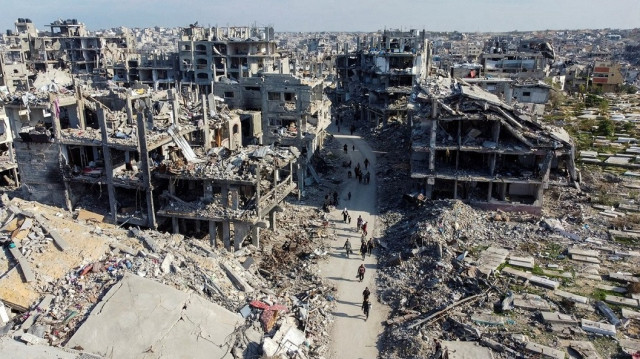
The brutal war has been brought to a halt on Jan. 19 under a ceasefire and prisoner exchange agreement between Israel and Palestinian factions in Gaza.
According to Palestinian figures, the Israeli army has dropped over 100,000 tons of explosives across Gaza since Oct. 7, 2023, destroying and damaging around 88% of the territory’s infrastructure and buildings.
Nearly $38 billion will be needed to rebuild the Palestinian enclave after the Israeli war
Destroyed buildings
- The Israeli army destroyed 161,600 housing units and severely damaged 81,000 others, rendering them uninhabitable, while 194,000 housing units were partially damaged, according to figures released by Gaza’s government media office.
- Israel also destroyed 216 government buildings, 42 sports facilities and 137 schools and universities, while 357 schools and universities were partially damaged.
- At least 34 hospitals were also damaged and forced out of service by Israeli attacks, while 162 health facilities were targeted during the course of the war.
- Worship houses were not even spared as 832 mosques were destroyed, and 158 others damaged while three churches sustained damage.
- The Israeli army also destroyed 206 archaeological and heritage sites and 19 cemeteries in the enclave.
Infrastructure
- Israel destroyed some 330,000 linear meters of Gaza’s water networks, according to Palestinian authorities.
- Some 665,000 linear meters of Gaza’s sewage and sanitation networks were also destroyed in Israeli attacks.
- According to Gaza’s government media office, Israeli airstrikes also destroyed over 3,680 linear kilometers of the electricity network in the enclave.
- As for roads, the Israeli army bulldozed and destroyed over 2.8 million linear meters of Gaza’s paved streets and roads.
- At least 47,000 Palestinians were killed, mostly women and children, and over 110,700 others injured in the Israeli war since Oct. 7, 2023, according to local health authorities.
- The Israeli onslaught has left more than 11,000 people missing, with widespread destruction and a humanitarian crisis that has claimed the lives of many elderly people and children in one of the worst global humanitarian disasters ever.
The International Criminal Court (ICC) issued arrest warrants in November last year for Israeli Prime Minister Benjamin Netanyahu and his former Defense Minister Yoav Gallant for war crimes and crimes against humanity in Gaza.
Israel also faces a genocide case at the International Court of Justice for its war on the enclave.
https://www.yenisafak.com/en/world/factbox-gaza-lies-in-ruins-after-15-month-israeli-war-3697525
Palestinian Information Center – January 22, 2025
Over 100 Jewish settlers defile Aqsa Mosque
Dozens of extremist Jewish settlers desecrated the Aqsa Mosque in Occupied Jerusalem on Wednesday mornin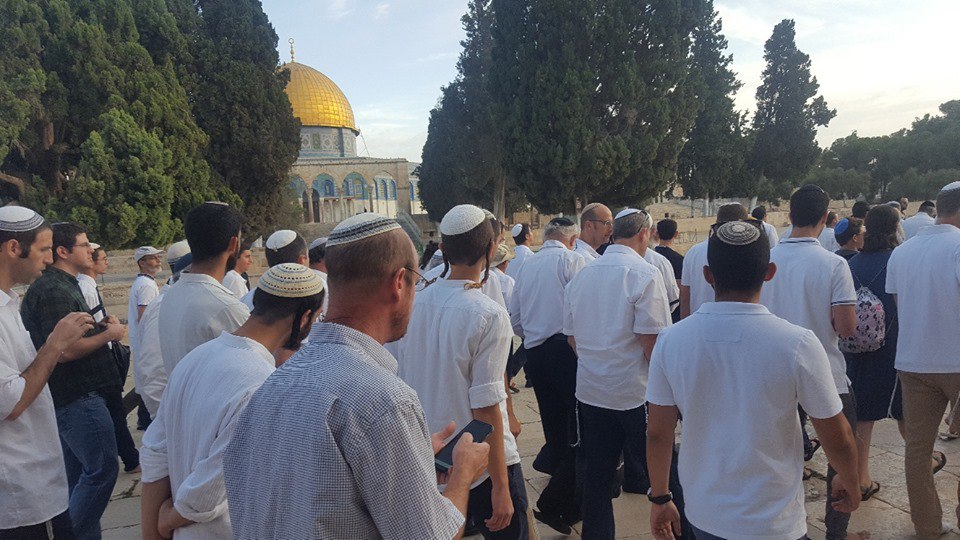 g.
g.
According to local sources, 102 settlers entered the Mosque in groups through its Maghariba Gate and toured its courtyards under tight police protection.
A number of settlers escorted by police officers also gathered in the eastern area of the Mosque and embarked on performing Talmudic prayers.
Meanwhile, the Israeli occupation police imposed movement and entry restrictions on Muslim worshipers at the Aqsa Mosque’s entrances and gates.
The Aqsa Mosque is exposed to daily desecration by Jewish settlers and police forces in the morning and the afternoon except on Fridays and Saturdays.
In a related context, Jerusalemite figures and activists have urged Palestinian citizens to march en masse to the Aqsa Mosque and intensify their presence in its courtyards to protect it against settler desecration.
https://english.palinfo.com/news/2025/01/22/332691/
Lost childhood: The unknown fate of Gaza children abducted by Israeli forces amid war
By Maryam Qarehgozlou
Amid the ruins of a desolate home in Gaza, a baby's cries pierce the heavy silence. Alone in the wreckage, she lies fragile and defenseless, surrounded by the echoes of devastation.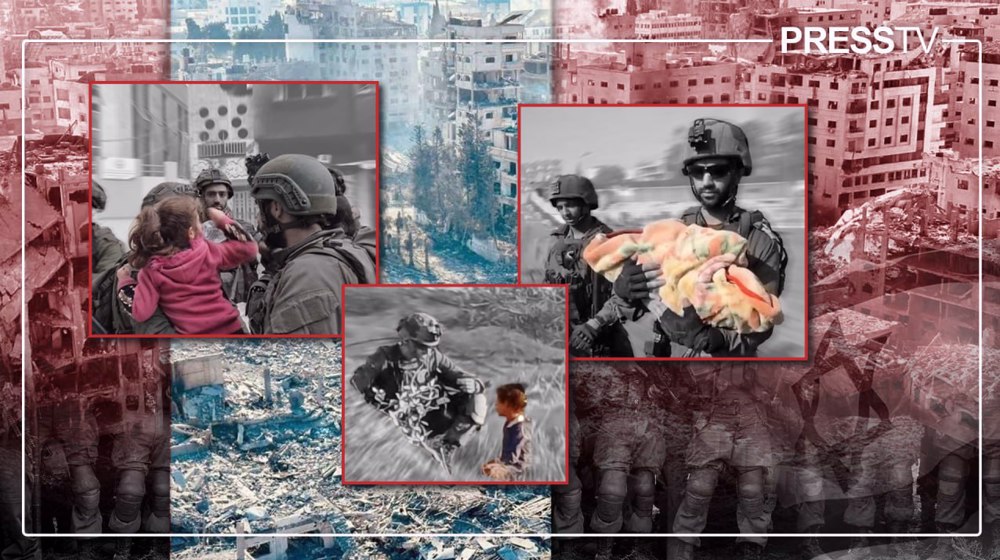
Her tiny face, streaked with dust and sorrow, is a reflection of fear and confusion. In a world that has crumbled around her, she yearns for her mother’s warm embrace, for a soothing lullaby.
The United Nations’ reference to the “sea of orphaned children” in the besieged Gaza Strip shines light on a devastating reality: between 17,000 and 18,000 children have been left without family members as a result of the relentless, 15-month-long Israeli genocidal onslaught.
These young victims of the Israeli genocidal war, which has killed more than 47,000 Palestinians, most of them children, now face a precarious future, devoid of support that every child needs and deserves.
Compounding the tragedy, disturbing accounts of orphaned or separated children abducted by Israeli regime soldiers during the war have emerged, with their fates remaining shrouded in uncertainty.
Following the death of Israeli military commander Harel Itah on December 30, 2023, in Gaza, accounts from his friends and relatives revealed a shocking incident: Itah had abducted a baby girl (and a dog) from Gaza and taken her to Israeli-occupied territories.
After Itah’s death, his friend Shahar Mendelson was interviewed on Galei Tzahal, the Israeli army’s radio station, recounting that Itah found a crying baby in Gaza and decided to “bring her back to Israel.”
“He talked to one of the friends during his time in Gaza and told him that in one of the houses he entered, he heard the crying of a baby girl, and he decided to send her to Israel,” Mendelson said.
Even Yael Dan, the radio show host, sounded puzzled by the story: “Wait for a moment, I think I misheard you,” she said repeating what Mendelson said in the interview.
Galei Tzahal (Galatz) initially posted about the interview on December 31, 2023, but they soon deleted it. However, screenshots of the post remain available on X, formerly Twitter.
Many Israeli social media users urged Galatz to delete the post, saying that the revelation could be harmful to “Israeli Hasbara,” a Hebrew term for media propaganda.
Around the same time, Itah’s brother shared a similar account in an interview with Kan Reshet Bet radio show Kalman-Liberman. He detailed a story about an abandoned baby Harel had found in Gaza, whom “they drove back" to the occupied territories.
“Harel discovered a Gazan baby girl amid the ruins. While they were searching the structures for information, he heard a noise and found the baby. Then, they drove her back to Israel," Itah’s brother was quoted as saying, recalling the incident.
Ynet, an Israeli website, also cited the story in an article about Itah’s funeral on December 31, 2023.
The article revealed that the baby girl was likely taken to a hospital in the Israeli-occupied territories.
Ynet quoted one of Itah’s friends, who stated that Harel told him that he heard the cries of a baby girl in Gaza, and "he made sure that she was brought to a hospital in Israel for treatment.”
The troubling revelation raised concerns about the well-being of the child and sparked outrage over the conduct of Israeli occupation forces during the carnage in Gaza.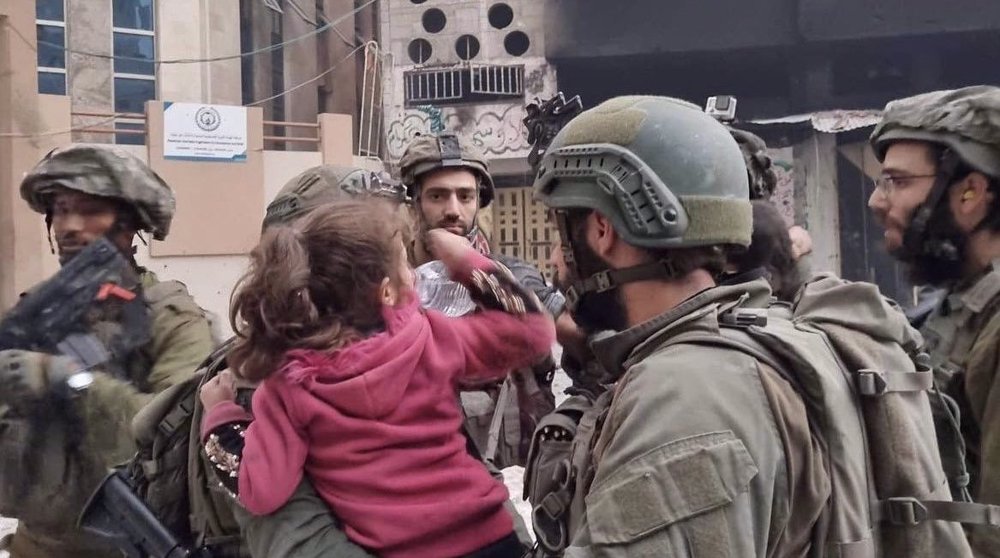
There have been calls for an investigation into the baby girl’s fate and the actions of the Israeli military.
Despite growing concerns and repeated calls for information, Israeli journalists and military officials have either kept mum about the issue or provided little clarity on the matter, with some even denying the existence of the child.
On January 1, 2024, Israeli journalist Nir Gontarz shared the Israeli military’s response regarding the fate of the abducted baby in an X post.
“We are not familiar with the described event during which a Gazan baby girl was brought to Israel for treatment and later returned to the Gaza Strip. Relevant parties are checking the source of the claim.”
However, none of the Israeli media reports had previously mentioned the child being returned to Gaza.
Nurit Yohanan, a reporter at the Israeli Public Broadcasting Corporation (Kan), asserted in an X post on January 2, 2024, that the Israeli military had no knowledge of the baby girl and that no such child from Gaza had been admitted to an Israeli hospital recently.
“For several days now, there has been talk of an [Israeli] soldier who found a baby girl from Gaza during fighting, and it was implied that she was brought into Israel," she wrote.
"I have no information about the baby’s rescue (the [military] doesn’t know about it), but no baby girl from Gaza has arrived at an Israeli hospital recently."
Roy Sharon, a military reporter based in occupied al-Quds, on January 2, 2024, quoted an unnamed Israeli military spokesperson on X saying that investigations have revealed that Itah’s friend had misheard the story and that he had rescued a dog from the rubble in Gaza, not a baby girl.
“After an investigation, no baby girl was taken from Gaza to Israeli territory. The claims of a baby girl being kidnapped are completely baseless. What happened? The late Captain Harel Itah rescued a dog from the rubble in Gaza and brought it to Israel. Somehow his friend mistakenly heard that it was a baby," the spokesperson was quoted as saying.
These conflicting reports and the lack of concrete information have left many questions unanswered, including the discrepancy between the accounts provided by Itah’s friends and relatives.
The abduction of the baby girl from Gaza prompted the Palestinian Ministry of Foreign Affairs to demand her release, condemning the actions of the Israeli soldier involved.
In a statement issued last January, the ministry emphasized that such actions “solidify the belief that the Israeli army is committing the worst crimes of genocide.”
On February 19, 2024, the Office of the United Nations High Commissioner for Human Rights (OHCHR) also addressed the abduction of the baby girl in a report on human rights violations against Palestinian women and girls by occupation soldiers.
The UN experts expressed concern over the reports of an unknown number of Palestinian women and children, including girls, who have gone missing following their contact with the Israeli military in Gaza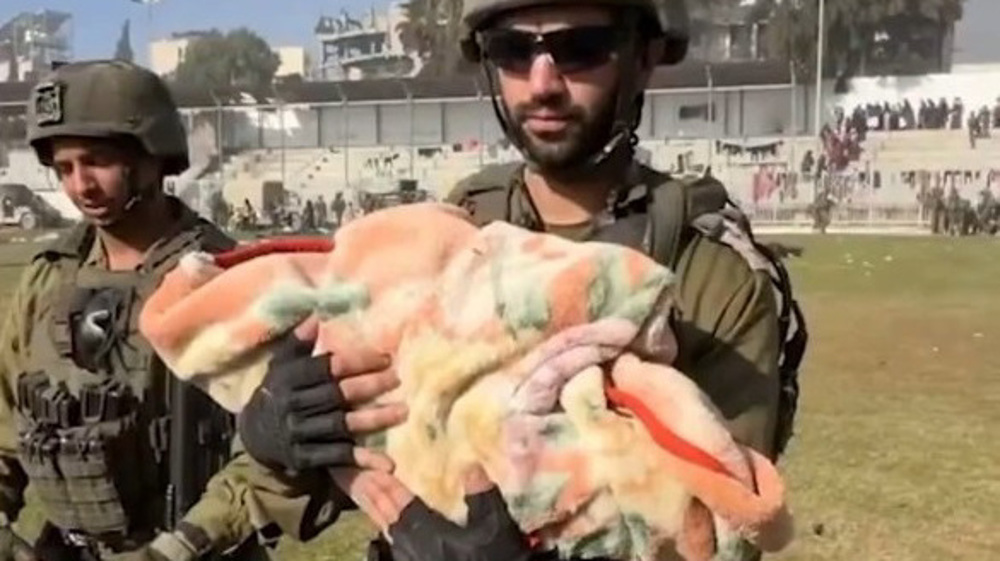 .
.
“There are disturbing reports of at least one female infant forcibly transferred by the Israeli army into Israel, and of children being separated from their parents, whose whereabouts remain unknown,” the experts noted in the report.
Under the Convention on the Prevention and Punishment of the Crime of Genocide the “forcible transfer of children of the group to another group” is classified as genocide if committed “with intent to destroy, in whole or in part, a national, ethnical, racial or religious group.”
Since the revelation was made, no further details about the baby girl’s whereabouts or well-being have been disclosed or reported in the media.
Disturbingly, reports suggest that the Israeli military personnel have abducted dozens of other Palestinian children throughout the 471-day devastating war on Gaza.
On August 31, 2024, Younis Tirawi, a Palestinian journalist, reported that Doha Talat, an 8-year-old girl from Gaza, was abducted by Israeli soldiers near the Rafah crossing, south of Gaza, in late July.
Tirawi’s report highlighted a photo shared by Ido Zahar, a soldier from Israel’s 432nd Tzabar Battalion, showing him with Doha in Gaza, with none of her family members in sight.
Zahar subsequently deleted the post and made his account private to avoid attention.
According to Tirawi, Doha was accompanied by an elderly man who was later detained by Israeli forces on allegations of having ties to Hamas. Since then, no information has surfaced regarding Doha’s whereabouts after she was separated from her companion.
On January 2, 2024, Rushdi al-Zara, a resident of Gaza City’s al-Zeitoun neighborhood, gave an interview that was widely circulated on social media platforms.
Al-Zara said Israeli soldiers conducted a raid on his house, during which his wife, Hadeel Youssef Issa Al Dahdouh, and their two children, 4-year-old Mohammad and 6-month-old Zain, were abducted.
He was himself detained for 25 days, and upon his release, he had no knowledge about the whereabouts of his wife and children.
Following the public outcry, the Israeli military was forced to release his children to northern Gaza, allowing him to establish contact with them. However, the whereabouts of his wife remain unknown.
On January 2, 2024, Muhammad Shehada, a Palestinian writer, analyst from the Gaza Strip, and Chief of Communications and Programs at Euro-Med Human Rights Monitor, shared a message from a doctor’s group chat in a post on X.
The message detailed the case of two Palestinian children, aged 5 and 8, who were separated from their parents in Gaza amid the Israeli aggression and transferred to Barzilai, an Israeli military hospital.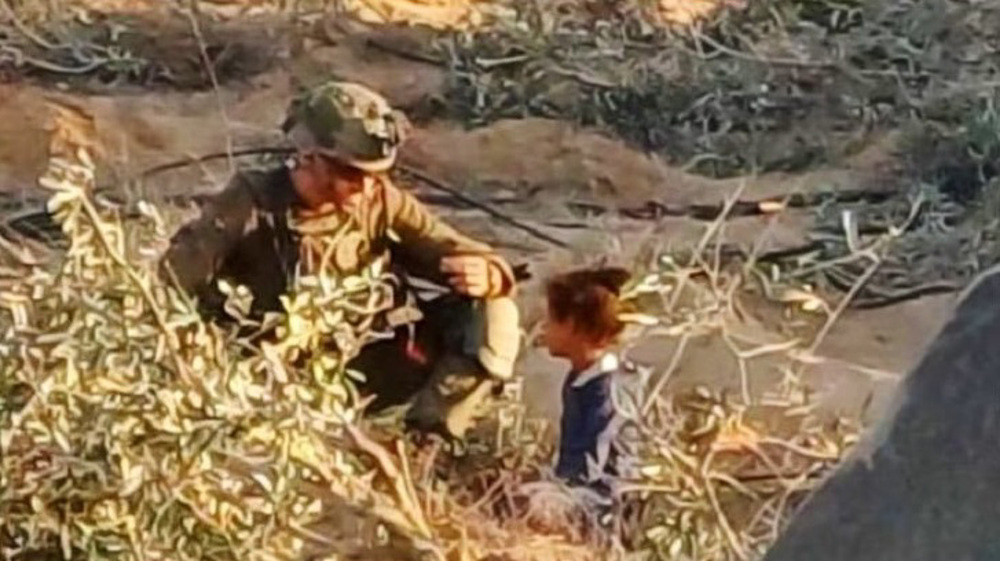
Shehada expressed concerns, questioning the lack of protocols for handling children found amid the war and the failure to immediately involve the International Committee of the Red Cross (ICRC).
“Does the army have no protocols on dealing with kids found during the fighting? Why aren’t they handed to ICRC immediately?!” Shehada wrote.
Muath Humaid, a Palestinian architect, and interior designer, also took to X on January 4, 2024, to reveal the abduction of four children in al-Mughazi.
According to Humaid, the children were taken from their homes by occupation forces to an unknown location, with the eldest being just 13 years old.
“The occupation forces abducted 4 children from their mother from their home in the al-Mughazi area in central Gaza and took them to an unknown location. There is no information about them until now. The eldest among them is 13 years old,” Humaid wrote.
Maha Hussaini, a human rights activist, journalist, and Strategy Director at Euro-Med Human Rights Monitor, wrote about another unsettling aspect of Israel’s abduction of children.
Hussaini stated that she had documented multiple cases where Israeli regime soldiers abducted blonde children from Gaza under the pretext that they might be Israelis.
“As Israeli forces are nearing my area of refuge, I just actually told my brother’s wife to dye her blonde daughter’s hair black!” she wrote in a post on X.
Additionally, a photo of an Israeli occupation soldier holding a baby on a football field further fueled concerns about the welfare of abducted Palestinian children.
The White Rose Society, an anti-fascist research group, shared the image in a post on X on January 1, 2024, raising questions about the baby’s whereabouts.
They said that the child’s mother had been killed earlier in the war, and their father was later apprehended and stripped on a field.
“No one knows the fate of this baby either, someone said the baby’s mother was murdered earlier in the war, and the baby’s father was caring for it, then he was rounded up and stripped naked in a field,” the White Rose Society wrote.
Over the past 15 months of the genocidal war, which halted with a ceasefire deal on Sunday, a staggering number of children, estimated at 18,000, have lost their lives in the Gaza Strip.
A report published by Save the Children in June shed light on the concerning issue of missing children in Gaza, estimating that up to 21,000 children remain unaccounted for.
“Thousands are presumed dead beneath the rubble. Others have been harmed beyond recognition by explosives, buried in unmarked or mass graves, or gone missing in the chaos of conflict,” it noted.
The report further highlighted the alarming number of Gazans, including children, who have been detained, disappeared, or abducted. Estimates indicate that up to 3,000 individuals are currently held in Gaza, with an unknown number of children among them.
“Detainees have reported being held in secret locations with no way of contacting loved ones, being forcibly transferred to Israel, having their identity documents confiscated, and being treated with extreme physical, psychological, and sexual violence,” it added.
According to the report, an increasing number of Palestinians, including children, have reported experiencing violence and abuse, such as having their bones broken, after being detained without any formal charges.
